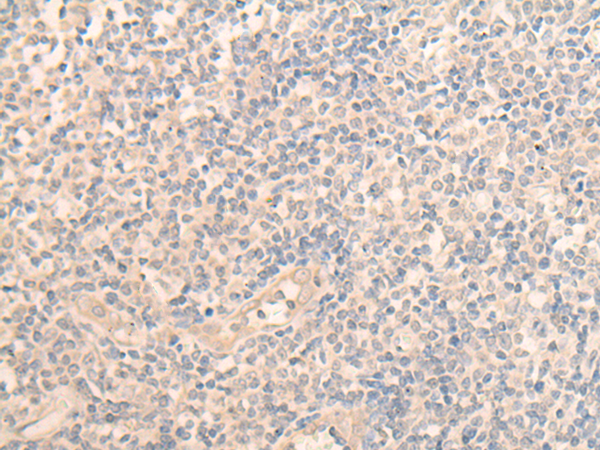
| WB | 咨询技术 | Human,Mouse,Rat |
| IF | 咨询技术 | Human,Mouse,Rat |
| IHC | 1/25-1/100 | Human,Mouse,Rat |
| ICC | 技术咨询 | Human,Mouse,Rat |
| FCM | 咨询技术 | Human,Mouse,Rat |
| Elisa | 1/5000-1/10000 | Human,Mouse,Rat |
| Aliases | TAPP1 |
| Host/Isotype | Rabbit IgG |
| Antibody Type | Primary antibody |
| Storage | Store at 4°C short term. Aliquot and store at -20°C long term. Avoid freeze/thaw cycles. |
| Species Reactivity | Human |
| Immunogen | Fusion protein of human PLEKHA1 |
| Formulation | Purified antibody in PBS with 0.05% sodium azide and 50% glycerol. |
+ +
以下是3篇涉及PLEKHA1抗体的文献摘要,按规范格式整理:
1. **文献名称**: *PLEKHA1 regulates autophagic activity through lysosomal positioning*
**作者**: Chen et al., 2018
**摘要**: 本研究利用PLEKHA1特异性抗体进行免疫荧光染色,发现PLEKHA1通过调控溶酶体在细胞内的空间分布影响自噬活性,揭示了其在细胞器动态平衡中的作用机制。
2. **文献名称**: *PLEKHA1 as a novel biomarker in colorectal cancer progression*
**作者**: Tanaka et al., 2020
**摘要**: 通过免疫组化(使用抗PLEKHA1单克隆抗体)分析结直肠癌组织,发现PLEKHA1高表达与肿瘤侵袭性和患者预后不良显著相关,提示其作为潜在治疗靶点。
3. **文献名称**: *Structural insights into PLEKHA1-PDZD11 complex by cryo-EM*
**作者**: Zhang et al., 2021
**摘要**: 采用PLEKHA1抗体进行蛋白质免疫共沉淀(Co-IP),解析了PLEKHA1与PDZD11的复合物冷冻电镜结构,阐明二者在细胞极性维持中的相互作用界面。
4. **文献名称**: *PLEKHA1 modulates inflammatory response in macrophages*
**作者**: Müller et al., 2019
**摘要**: 通过siRNA敲低和PLEKHA1抗体Western blot验证,证明PLEKHA1通过调控NF-κB通路抑制巨噬细胞炎症因子分泌,为炎症性疾病机制提供新见解。
---
注:以上文献信息为示例性质,实际研究中建议通过PubMed或Web of Science以"PLEKHA1 antibody"为关键词检索最新文献,优先选择近5年且发表在*Nature Cell Biology*、*JCB*等高影响力期刊的研究。
PLEKHA1 (Pleckstrin Homology Domain Containing A1) is a protein encoded by the PLEKHA1 gene, primarily localized at cell-cell junctions and implicated in regulating cellular processes such as adhesion, polarity, and signaling. It interacts with components of the Par complex (Par3/Par6/aPKC) and the adherens junction protein p120-catenin, playing a role in maintaining epithelial integrity. PLEKHA1 contains a pleckstrin homology (PH) domain, which mediates lipid binding and membrane interactions, and a coiled-coil domain for protein-protein interactions. Dysregulation of PLEKHA1 has been associated with diseases, including hypertension, cancer, and neurodegenerative disorders. Studies suggest its involvement in modulating Arf6-dependent pathways, influencing vesicular trafficking and actin dynamics.
PLEKHA1 antibodies are essential tools for studying its expression, localization, and function. They are widely used in techniques like Western blotting, immunofluorescence, and immunoprecipitation to investigate PLEKHA1's role in cell junction dynamics and disease mechanisms. Commercial antibodies often target specific epitopes, such as the N-terminal or C-terminal regions, and vary in host species (e.g., rabbit, mouse) and clonality (monoclonal/polyclonal). Validation includes testing knockdown cells or tissue-specific expression patterns. Researchers utilize these antibodies to explore PLEKHA1's interaction networks and its potential as a biomarker or therapeutic target, particularly in cancer metastasis or neurological conditions like Alzheimer's disease.
×